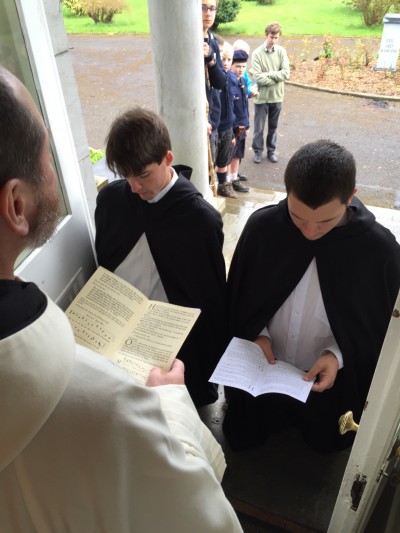Thy mercy dost compass me about
 Nicholas and Benjamin were welcomed as postulants today, Divine Mercy Sunday.
Nicholas and Benjamin were welcomed as postulants today, Divine Mercy Sunday.
Quasimodo Sunday: The Feast of Divine Mercy
In the early Church, the newly-baptized would conclude their week-long celebration of new life today by putting aside the white garments received at Baptism. Mother Church, addressing herself to her new–born infant children, sings in today’s Introit:
You are children new-born, and all your craving must be for the soul’s pure milk, that will nurture you into salvation, once you have tasted, as you have surely tasted, the goodness of the Lord. (1 Peter 2:2–3)
Today’s glorious Introit is a key text for us Benedictine monks, and today, in particular, it is a message addressed to Benjamin and Nicholas who are officially beginning their time of postulancy. To postulate means “to ask”. In the monastic journey, the postulancy is a period of time during which a man asks to be received as a novice. He is already in the monastery; he has left the world; he is beginning to live as a monk, but he has not yet been clothed in the habit of Saint Benedict nor been given a new name. The postulancy is a time of asking. Asking for what? Asking of whom? Asking how?
First of all, Benjamin and Nicholas are in effect, saying to God:
I am here now. Like the prodigal son, I have come to Thee from a far–away land. I have come to the monastery to throw myself into the arms of Thy mercy. I have come, O God, to be held in the embrace of Thy mercy, and to be filled with that mercy by which Thou makest all things new.
Then, to me and to the community, Benjamin and Nicholas are saying:
Show us mercy. Let us live with you in this house of mercy. Teach us to sing with our very lives, even as you do. “Lord, thou dost give protection to man and beast, so rich is thy divine mercy; under the shelter of those wings we, frail children of earth, will find confidence. With thy rich store thou wilt nourish us, bid us drink deep at thy fountain of contentment. In thee is the source of all life; thy brightness breaks on our eyes like dawn”. (Psalm 35:7–10).
How are Benjamin and Nicholas asking these things of God and of this monastic family? They are asking boldly, without hesitation, and with an boundless confidence in the mercy of God.
Risen Jesus, my Lord and my God, if I am here today it is because Thou has brought me here, carrying me on Thy sacred shoulders, and setting me in the green pastures Thou hast reserved for me. Since Thou hast already done this for me, I can have full confidence that Thou wilt do even more. And so, I am here, to ask great things of Thee. I shall not ask for small things, for things that are calculated and measured. I shall ask for immense things. I shall ask of Thee the very things that Thou Thyself, in Thy mercy, hast already determined to give me. Give me, then, all that Thou wouldst see in me. Do in me whatever Thou desirest to find in me. Change in me whatever Thou wouldst change in me. Break all my resistances. Burn away whatever is incompatible with the work Thou art undertaking in my soul today. Like a mighty eagle, swoop down upon me and, then, bear me upon the wings of Thy mercy and Thy truth.
 Pure Spiritual Milk
Pure Spiritual Milk
Henceforth, dear Ben and Nicholas, as the Introit says, “All your craving must be for the soul’s pure milk” (1 Peter 2:2). This craving for the Word of God is a sign of spiritual health. It is, moreover, an indication of a man’s irresistible need to become a monk, for what is a monk if not a man who so craves the Word of God that he chooses to spend his entire life listening to it? I am reminded of the words of the young Carmelite, Blessed Elizabeth of the Trinity:
O Eternal Word,
utterance of my God,
I want to spend my life listening to you,
to become totally teachable so that I might learn all from you.
Through all darkness, all emptiness, all powerlessness,
I want to keep my eyes fixed on you
and to remain under your great light.
O my Beloved Star,
so fascinate me
that I may never be able to leave your radiance.
One comes to the monastery to spend one’s life listening to the Eternal Word of God, the Divine Lògos, the Utterance that was before the creation of the World:
At the beginning of time the Word already was; and God had the Word abiding with him, and the Word was God. He abode, at the beginning of time, with God. It was through him that all things came into being, and without him came nothing that has come to be. In him there was life, and that life was the light of men. (John 1:1–4)
Listen, O Son
Not for nothing is the very first word of the Holy Rule, Ausculta, O fili — “Listen, O son”. A postulant is a man who is asking and, in asking, he holds himself in readiness for an answer. He must listen for the answer with the same intensity and singlemindedness with which he asks his questions.
No one of us can ask the right questions, the essential questions, the life–determining questions, except by an intervention of Divine Mercy. God has, in every man’s life, a unique way of bringing him to the point of asking the questions that need to be asked, if life is to be at all worth living. And the very God who prompts the asking of the question is Himself the answer. There is Divine Mercy behind you, Ben and Nicholas, and there is Divine Mercy ahead of you. There is Divine Mercy below you to catch you if you lose your footing and risk falling; there is Divine Mercy above to draw you upward “where Christ now sits at the right hand of God” (Colossians 3:1); and there is Divine Mercy all about you, encompassing you on every side.
Walk I or sleep I, thou canst tell; no movement of mine but thou art watching it. Before ever the words are framed on my lips, all my thought is known to thee; rearguard and vanguard, thou dost compass me about, thy hand still laid upon me. (Psalm 138:3–5)
Under the Sign of the Mercy of God
Dear sons, Ben and Nicholas, you are embarking on a great journey; a journey that will be marked by a succession of questions and of answers. Never be afraid to ask the questions. Never close the ear of your heart to the answers. Your journey is beginning under the sign of the mercy of God. Our father Saint Benedict, and I with him, ask of you this one thing: that you never despair of the mercy of God. Et de Dei misericordia nunquam desperare. “And never to despair of the mercy of God” (Rule of Saint Benedict, Chapter IV). Do this, and you will find joy in all your asking, joy in all your listening, and joy in the obedience that is the path to life everlasting. Amen.
